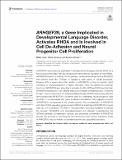ARHGEF39, a gene implicated in developmental language disorder, activates RHOA and is involved in cell de-adhesion and neural progenitor cell proliferation
Abstract
ARHGEF39 was previously implicated in developmental language disorder (DLD) via a functional polymorphism that can disrupt post-transcriptional regulation by microRNAs. ARHGEF39 is part of the family of Rho guanine nucleotide exchange factors (RhoGEFs) that activate small Rho GTPases to regulate a wide variety of cellular processes. However, little is known about the function of ARHGEF39, or how its function might contribute to neurodevelopment or related disorders. Here, we explore the molecular function of ARHGEF39 and show that it activates the Rho GTPase RHOA and that high ARHGEF39 expression in cell cultures leads to an increase of detached cells. To explore its role in neurodevelopment, we analyse published single cell RNA-sequencing data and demonstrate that ARHGEF39 is a marker gene for proliferating neural progenitor cells and that it is co-expressed with genes involved in cell division. This suggests a role for ARHGEF39 in neurogenesis in the developing brain. The co-expression of ARHGEF39 with other RHOA-regulating genes supports RHOA as substrate of ARHGEF39 in neural cells, and the involvement of RHOA in neuropsychiatric disorders highlights a potential link between ARHGEF39 and neurodevelopment and disorder. Understanding the GTPase substrate, co-expression network, and processes downstream of ARHGEF39 provide new avenues for exploring the mechanisms by which altered expression levels of ARHGEF39 may contribute to neurodevelopment and associated disorders.
Citation
Anijs , M , Devanna , P & Vernes , S C 2022 , ' ARHGEF39, a gene implicated in developmental language disorder, activates RHOA and is involved in cell de-adhesion and neural progenitor cell proliferation ' , Frontiers in Molecular Neuroscience , vol. 15 , 941494 . https://doi.org/10.3389/fnmol.2022.941494
Publication
Frontiers in Molecular Neuroscience
Status
Peer reviewed
ISSN
1662-5099Type
Journal article
Description
SCV was supported by a Max Planck Research Group awarded by the Max Planck Gesellschaft, a Human Frontiers Science Program Grant (RGP0058/2016) and a UKRI Future Leaders Fellowship (MR/T021985/1). MA was supported by an International Max Planck Research School (IMPRS) Ph.D Fellowship from the Max Planck Institute for Psycholinguistics.Collections
Items in the St Andrews Research Repository are protected by copyright, with all rights reserved, unless otherwise indicated.

